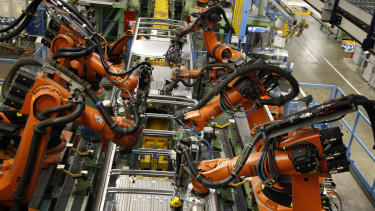Energy
Hungary to have a power plant no one else does
The unit will have a power consumption of up to 10 megawatts. For this purpose, Electrochaea and the MVM Group-related research and development incubator Smart Future Lab Plc founded the company Power-to-Gas Hungary Ltd (PtG Hungary Ltd).
The facility employs a power-to-gas technology based on biological methanation that is unique in the world and was developed by Electrochaea. A proprietary biocatalyst converts low-cost and stranded electricity from renewable energy sources and carbon dioxide into pipeline-grade renewable gas. The core of the system is a selectively evolved microorganism - a methanogenic archaea. The produced biomethane can be stored and directly injected into the existing natural gas grid.
The foundations of the technology were established at the University of Chicago.
Electrochaea is successfully operating a grid-scale plant with a power consumption of one megawatt in Denmark since April 2016. Further plants in Switzerland and the USA are under construction.
Plants of up to one gigawatt of capacity are planned to be set up in the medium term.
Via the research and development incubator Smart Future Lab Plc, a spin-off of the Hungarian MVM Group, the new company PtG Hungary has direct access to the Hungarian electricity and natural gas grid. The MVM Group, which is majority-owned by the Hungarian state, is the largest energy provider in Hungary and is among the 40 largest companies in Central and South-East Europe. By 2020, the MVM Group is aiming for a EBITDA (earnings before interest, taxes, depreciation and amortisation) of around EUR 821 million.
“Electrochaea has found a way to solve the problem of storing renewable energy whilst at the same time contributing to the permanent reduction of climate-damaging carbon dioxide," commented Zsolt Bertalan, Managing Director of the MVM subsidiary Smart Future Lab Plc.
“The potential of this disruptive technology is enormous," he added.
Mich Hein, Managing Director of Electrochaea GmbH, called the plant a “real milestone" in the company’s development, adding that via Smart Future Lab and the joint undertaking PtG Hungary they will “continue to grow very strongly, not just in Hungary, but in the whole of Central Europe" as they continue to market this technology worldwide.
The facility employs a power-to-gas technology based on biological methanation that is unique in the world and was developed by Electrochaea. A proprietary biocatalyst converts low-cost and stranded electricity from renewable energy sources and carbon dioxide into pipeline-grade renewable gas. The core of the system is a selectively evolved microorganism - a methanogenic archaea. The produced biomethane can be stored and directly injected into the existing natural gas grid.
The foundations of the technology were established at the University of Chicago.
Electrochaea is successfully operating a grid-scale plant with a power consumption of one megawatt in Denmark since April 2016. Further plants in Switzerland and the USA are under construction.
Plants of up to one gigawatt of capacity are planned to be set up in the medium term.
Via the research and development incubator Smart Future Lab Plc, a spin-off of the Hungarian MVM Group, the new company PtG Hungary has direct access to the Hungarian electricity and natural gas grid. The MVM Group, which is majority-owned by the Hungarian state, is the largest energy provider in Hungary and is among the 40 largest companies in Central and South-East Europe. By 2020, the MVM Group is aiming for a EBITDA (earnings before interest, taxes, depreciation and amortisation) of around EUR 821 million.
“Electrochaea has found a way to solve the problem of storing renewable energy whilst at the same time contributing to the permanent reduction of climate-damaging carbon dioxide," commented Zsolt Bertalan, Managing Director of the MVM subsidiary Smart Future Lab Plc.
“The potential of this disruptive technology is enormous," he added.
Mich Hein, Managing Director of Electrochaea GmbH, called the plant a “real milestone" in the company’s development, adding that via Smart Future Lab and the joint undertaking PtG Hungary they will “continue to grow very strongly, not just in Hungary, but in the whole of Central Europe" as they continue to market this technology worldwide.












